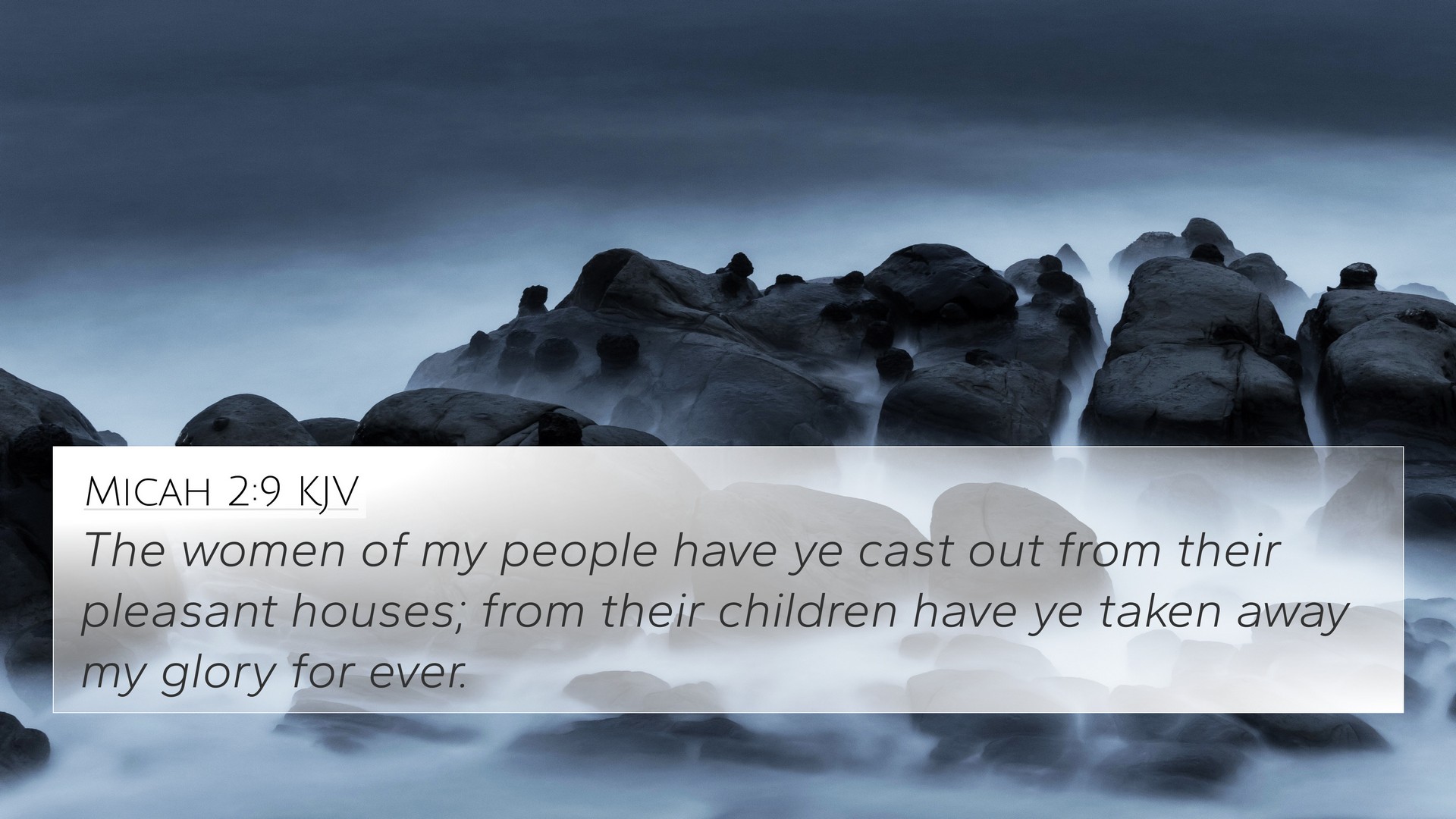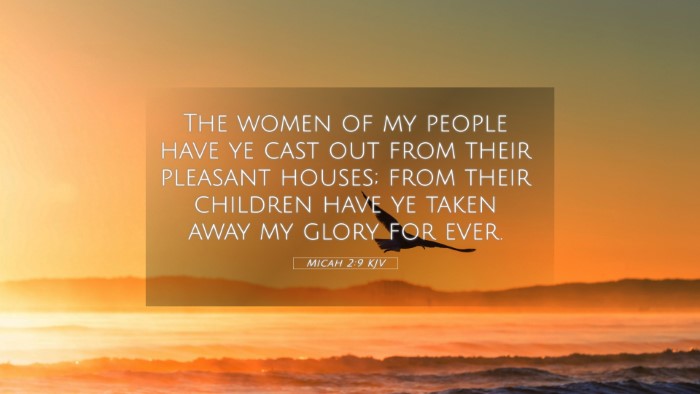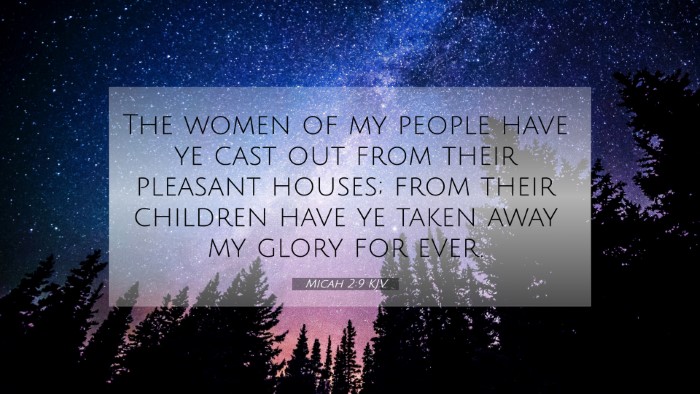Old Testament
Genesis Exodus Leviticus Numbers Deuteronomy Joshua Judges Ruth 1 Samuel 2 Samuel 1 Kings 2 Kings 1 Chronicles 2 Chronicles Ezra Nehemiah Esther Job Psalms Proverbs Ecclesiastes Song of Solomon Isaiah Jeremiah Lamentations Ezekiel Daniel Hosea Joel Amos Obadiah Jonah Micah Nahum Habakkuk Zephaniah Haggai Zechariah MalachiMicah 2:9 Similar Verses
Micah 2:9 Cross References
The women of my people have ye cast out from their pleasant houses; from their children have ye taken away my glory for ever.
Uncover the Rich Themes and Topics of This Bible Verse
Listed below are the Bible themes associated with Micah 2:9. We invite you to explore each theme to gain deeper insights into the Scriptures.
Micah 2:9 Cross Reference Verses
This section features a detailed cross-reference designed to enrich your understanding of the Scriptures. Below, you will find carefully selected verses that echo the themes and teachings related to Micah 2:9 KJV. Click on any image to explore detailed analyses of related Bible verses and uncover deeper theological insights.

Habakkuk 2:14 (KJV) »
For the earth shall be filled with the knowledge of the glory of the LORD, as the waters cover the sea.

Ezekiel 39:21 (KJV) »
And I will set my glory among the heathen, and all the heathen shall see my judgment that I have executed, and my hand that I have laid upon them.
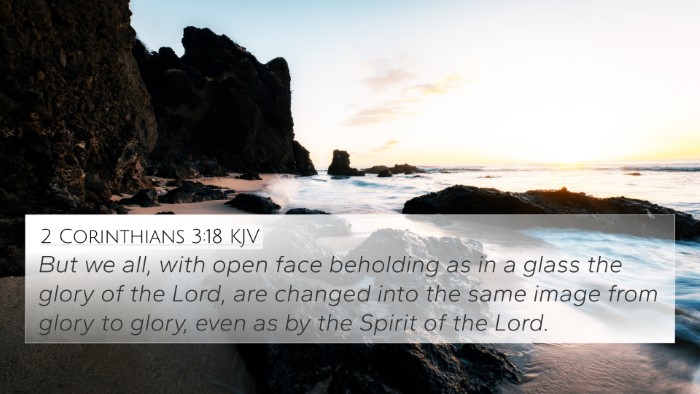
2 Corinthians 3:18 (KJV) »
But we all, with open face beholding as in a glass the glory of the Lord, are changed into the same image from glory to glory, even as by the Spirit of the Lord.
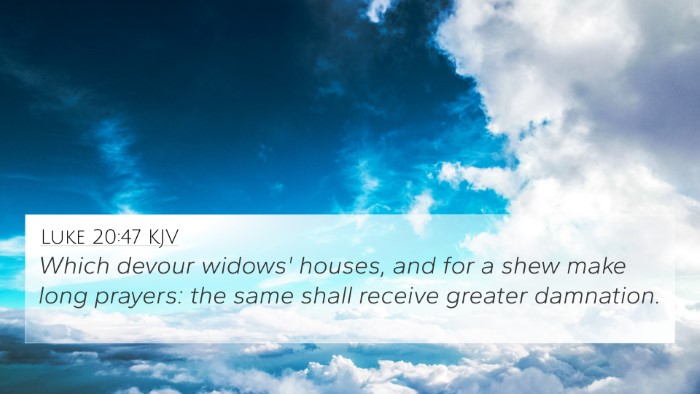
Luke 20:47 (KJV) »
Which devour widows' houses, and for a shew make long prayers: the same shall receive greater damnation.
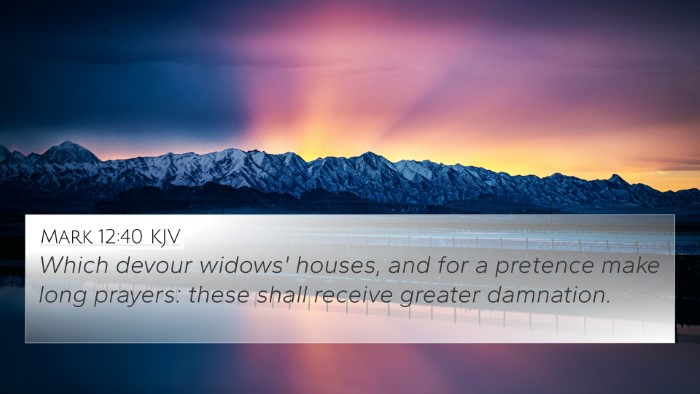
Mark 12:40 (KJV) »
Which devour widows' houses, and for a pretence make long prayers: these shall receive greater damnation.
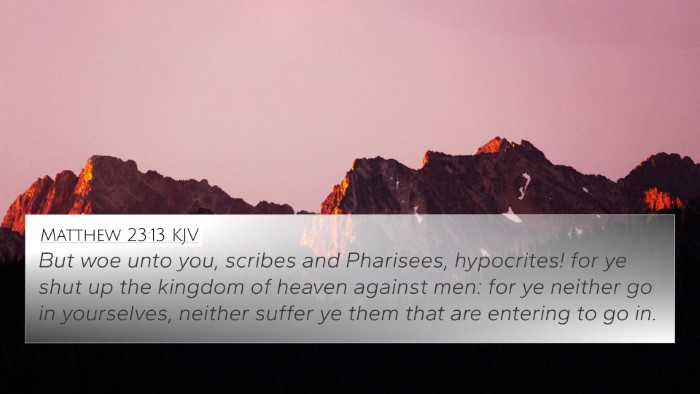
Matthew 23:13 (KJV) »
But woe unto you, scribes and Pharisees, hypocrites! for ye shut up the kingdom of heaven against men: for ye neither go in yourselves, neither suffer ye them that are entering to go in.
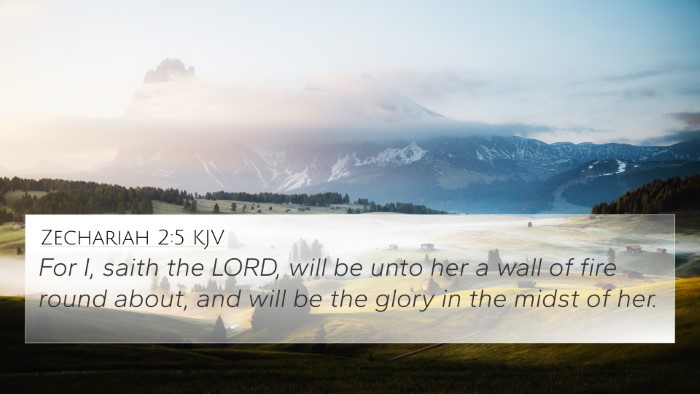
Zechariah 2:5 (KJV) »
For I, saith the LORD, will be unto her a wall of fire round about, and will be the glory in the midst of her.
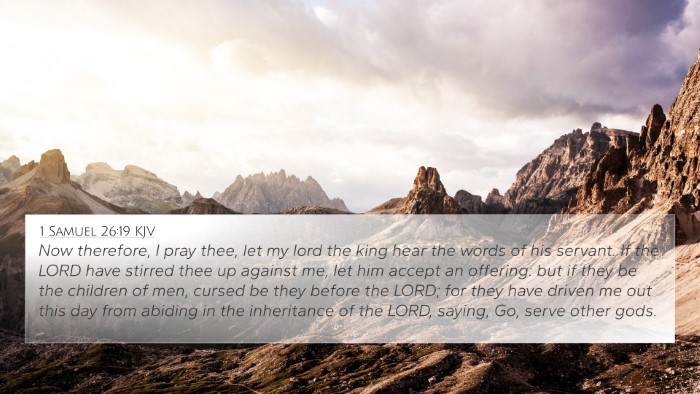
1 Samuel 26:19 (KJV) »
Now therefore, I pray thee, let my lord the king hear the words of his servant. If the LORD have stirred thee up against me, let him accept an offering: but if they be the children of men, cursed be they before the LORD; for they have driven me out this day from abiding in the inheritance of the LORD, saying, Go, serve other gods.
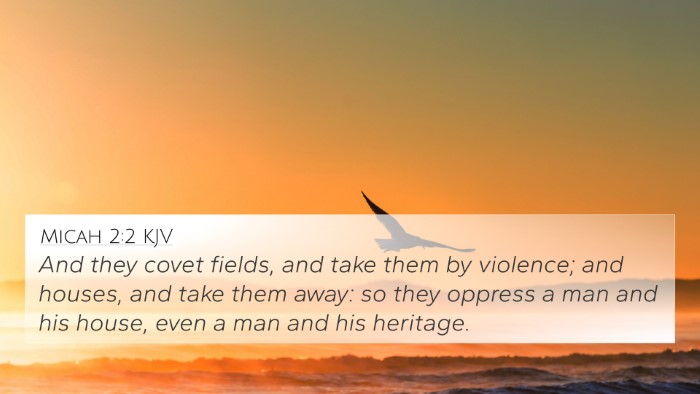
Micah 2:2 (KJV) »
And they covet fields, and take them by violence; and houses, and take them away: so they oppress a man and his house, even a man and his heritage.
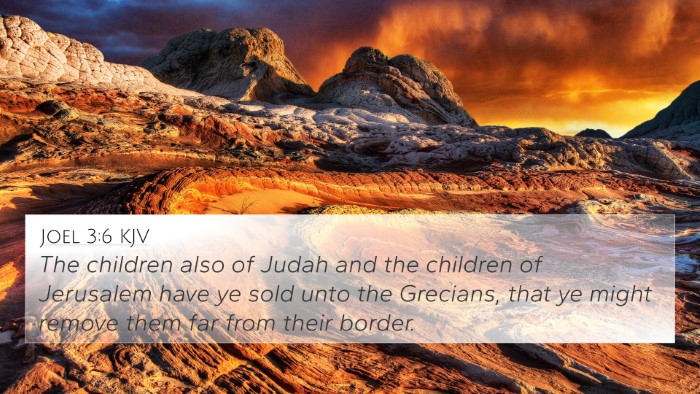
Joel 3:6 (KJV) »
The children also of Judah and the children of Jerusalem have ye sold unto the Grecians, that ye might remove them far from their border.
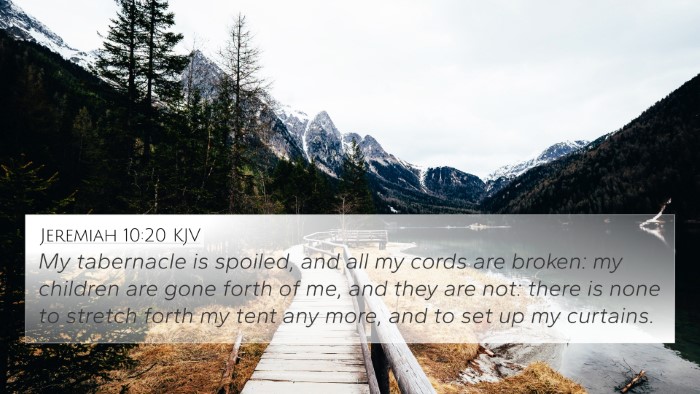
Jeremiah 10:20 (KJV) »
My tabernacle is spoiled, and all my cords are broken: my children are gone forth of me, and they are not: there is none to stretch forth my tent any more, and to set up my curtains.
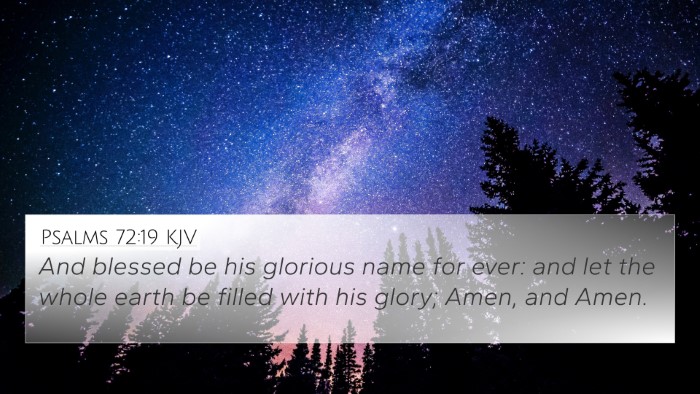
Psalms 72:19 (KJV) »
And blessed be his glorious name for ever: and let the whole earth be filled with his glory; Amen, and Amen.
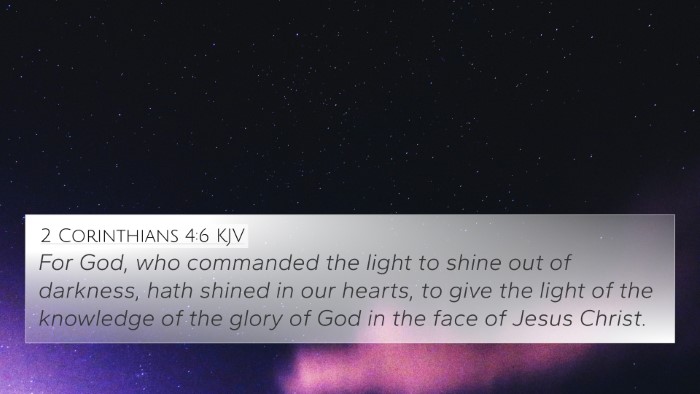
2 Corinthians 4:6 (KJV) »
For God, who commanded the light to shine out of darkness, hath shined in our hearts, to give the light of the knowledge of the glory of God in the face of Jesus Christ.
Micah 2:9 Verse Analysis and Similar Verses
Understanding Micah 2:9
Micah 2:9 states: "The women of my people you drive out from their pleasant homes; From their children you take away My glory forever." This verse speaks to the injustice faced by the vulnerable and highlights the moral obligations of the powerful towards those they oppress.
Summary of Insights
The verse serves as a condemnation against the oppression of women and children in Israel, presenting an image of the anguish caused by the actions of the rulers and the wealthy, who unjustly seize land and property. The commentaries by Matthew Henry, Albert Barnes, and Adam Clarke emphasize various themes surrounding this verse.
- Matthew Henry: Matthew Henry points out the cruelty of evicting women from their homes, which symbolizes a broader societal sin. He articulates that such actions reflect a disregard for family and social harmony, showing how the powerful neglect their ethical duties.
- Albert Barnes: Albert Barnes highlights the gravity of the sin described in this verse. He explains that these injustices are a violation of divine law, illustrating God's displeasure with those who exploit the defenseless. It deepens the reader's understanding by connecting societal oppression with divine retribution.
- Adam Clarke: Adam Clarke focuses on the implications of “taking away My glory.” He interprets this as God’s lamentation over the loss of the innocent, noting that God values the welfare of the marginalized. Clarke argues that this verse warns the oppressors of impending judgment from God.
Thematic Connections
The themes in Micah 2:9 resonate through various parts of the Bible, establishing connections and parallels that enhance its meaning. Here are some notable cross-references:
- Isaiah 10:1-2: This passage also condemns unjust decrees that oppress the needy and widows.
- Proverbs 22:22-23: Advises against robbing the poor and warns that God will defend their cause.
- Zechariah 7:10: Highlights the importance of showing mercy and compassion to one another.
- James 5:1-6: Warns the rich about the miseries that will come upon them for their exploitation of laborers.
- Luke 18:7-8: Jesus speaks of God avenging those who cry out for justice, connecting to the plight of the wronged.
- Exodus 22:22-24: Explicitly commands protection for widows and orphans, reinforcing God's concern for social justice.
- Psalms 146:9: The Lord watches over the strangers and upholds the widow and the fatherless, offering hope for the oppressed.
- Matthew 25:40: Jesus ties acts of care for the marginalized directly to service rendered to Him, emphasizing the importance of compassion.
- Jeremiah 22:3: Gives a command to do justice and righteousness, particularly to the disadvantaged within society.
- Micah 6:8: Summarizes the Lord's expectations: to do justly, love mercy, and walk humbly with God, reinforcing ethical living.
Application of Cross-Referencing
Understanding Micah 2:9 in light of these connected verses encourages a holistic view where one sees the overarching Biblical narrative that asserts the value of justice and compassion. Tools for Bible cross-referencing, such as a Bible concordance or a cross-reference guide, can help readers find deeper meanings and insights across the scriptures.
Conclusion
Micah 2:9 stands as a powerful reminder of the need for social justice and the protection of the vulnerable. In reflective meditation and study, believers can find strength in the unity of the scripture and the voice that cries out for justice from Genesis to Revelation. The connections between Bible verses convey not only the weight of individual actions but also God's commitment to uphold and restore the broken-hearted and the oppressed.
